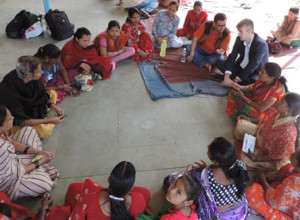India Programme Committee meets in Bhopal
The PHF India Programme Committee met in Bhopal, Madhya Pradesh, from 10 to 14 February. Committee members met with grantees, consultants other organisations to discuss a broad range of social justice issues in India and their plans to address them.
A major priority of the Committee’s time was given to ‘lost childhoods’ – a strand of the India programme strategy that focuses on the growing number of children who run away from home and end up sleeping in railway stations. According to charity Railway Children, over 12 million children live on the streets in India, with 120,000 more arriving in railway stations each year. In effect, every five minutes a child arrives alone on a railway platform in India. They are often fleeing neglect or abuse, or just trying to find a way out of poverty at home by travelling to a big city. However, once there, they have to beg for or steal money and food and become vulnerable to exploitation.
Following a visit to the Bhopal railway station and a children’s home, a seminar was led by Railway Children – India to outline the scale of the issue, the work different organisations are doing to address it and the types of intervention taking place. Partner NGOs from different parts of the country were invited to share experiences and discuss ideas and strategies.
The dialogue follows the publication of a PHF report last year, ‘Lost childhoods’, which considered factors contributing to street children’s exploitation and assessed the impact of government policy and the work of NGOs on their situations.
Funding from the Foundation has been in place to provide care and protection for railway children since 2007, with money distributed among several organisations and the majority of funds going towards developing basic facilities for children living in railway stations and reuniting lost children with their families.

The India Programme Committee also focused on supporting communities in deprived areas of the country, visiting several grant holders and other organisations who work to open up access to resources and address inequality. Sangini, a grantee organisation from Bhopal, worked in an advisory capacity on gender issues before focusing on grassroots work with women from slum settlements and advocating more rights for domestic workers. The Foundation is funding it to support the collectivisation of domestic workers.The Committee also visited Gramin Vikas Sanstha, an organisation where families can apply for funds to plan their own projects, and Pradeepan, an organisation working to address inequality amongst agricultural workers.


